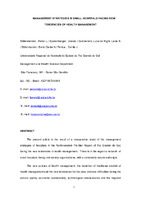Management strategies in small hospitals facing new tendencies of health management
Date
2021-11-17Author
Büttendender, Pedro Luis
Sparemberger, Ariosto
Zamberlam, Luciano
Righi, Liane B.
Büttenbender, Dóris Clarita N.
Perius, Danilo J.
Metadata
Show full item recordAbstract
The present article is the result of a comparative study of the management strategies of hospitals in the North-western Frontier Region of Rio Grande do Sul, facing the new tendencies in health management. There is in the region a network of small hospitals, being civil society organizations, with a community nature and origin.
The new policies of health management, the depletion of traditional models of health management and the new tendencies for the area, indicate difficulties facing the service quality, economic sustainability, technological obsolescence and the required resolution levels. The study can be defined as exploratory and the information was obtained through profound interviews and documental and bibliographical research.
The public policies are producing new challenges for the sustainability and survival of small hospitals, located in geographically peripheral regions. The strategies could contribute to the hospital organizations, as to the references to give priority to the public policies of health financing, the improvement of health conditions and the lives of the involved population.
Collections
- Revista Visión de Futuro [502]
The following license files are associated with this item:



